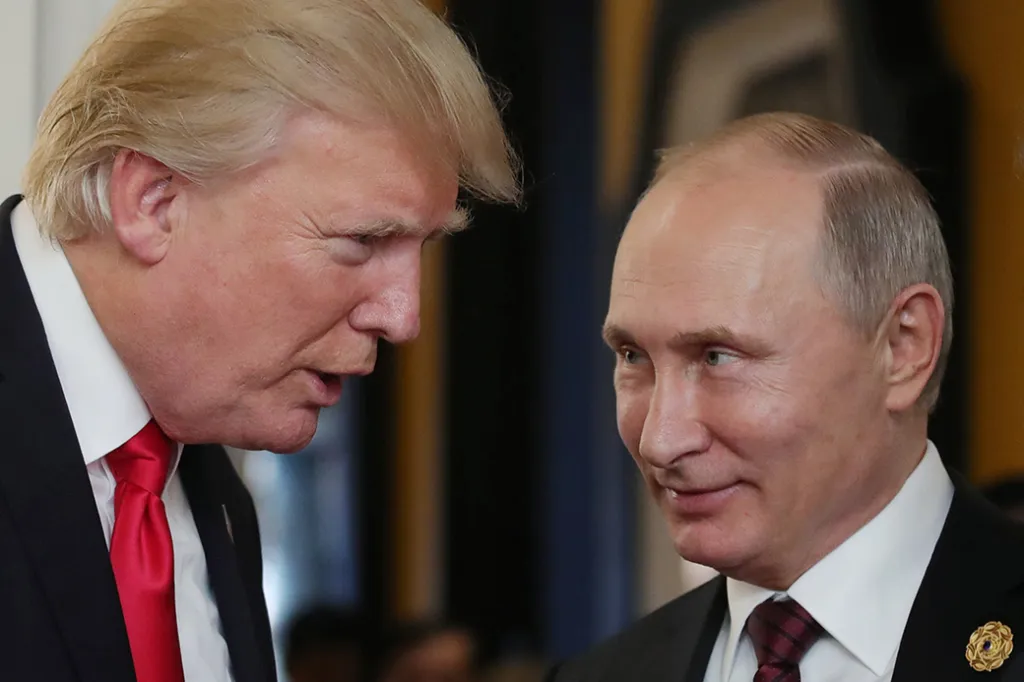WASHINGTON — President Donald Trump said Russian President Vladimir Putin pledged “very strongly” to retaliate after Ukraine’s weekend drone assault on Russian airfields, warning of further escalation in the nearly three-and-a-half-year-old war, even as diplomatic efforts continue to stall.

Speaking Wednesday after a one-hour, 15-minute phone call with Putin, Trump described the conversation as “good,” though he acknowledged it would not lead to immediate peace between Moscow and Kyiv.
“We discussed the attack on Russia’s docked airplanes, by Ukraine, and also various other attacks that have been taking place by both sides,” Trump wrote on his Truth Social platform. “It was a good conversation, but not a conversation that will lead to immediate Peace. President Putin did say, and very strongly, that he will have to respond to the recent attack on the airfields.”
The weekend assault — dubbed Operation Spider’s Web — marked a significant Ukrainian strike deep into Russian territory. According to Ukraine’s Security Service, the attack involved highly automated drones targeting five Russian airfields, damaging or destroying at least 41 military aircraft, including Tu-95, Tu-22, Tu-160 strategic bombers and A-50 surveillance planes. Footage released Wednesday appeared to show several aircraft on fire, though the Kremlin has not independently confirmed the full extent of the damage.
The White House said the United States had no prior knowledge of the attack. A Russian foreign policy adviser later confirmed that Trump emphasized this point to Putin during their call. Meanwhile, Ukrainian President Volodymyr Zelenskyy reportedly oversaw the operation, which officials say was over 18 months in the making.
In a separate action, Ukraine’s security agency claimed responsibility for an underwater explosion beneath the Kerch Bridge linking Russia to annexed Crimea, though Russian officials denied any damage.
Despite ongoing U.S.-led diplomatic efforts, peace negotiations remain stalled. Monday’s second round of talks in Istanbul between Russian and Ukrainian delegations ended with little progress. The sides agreed only to facilitate the exchange of thousands of dead and wounded troops.
Zelenskyy dismissed Moscow’s latest ceasefire proposal as a political stunt and “spam,” accusing Russia of trying to manipulate international perception by pretending to engage in meaningful dialogue.
“They voiced the same ultimatums they gave us two weeks ago — this time, just on paper,” Zelenskyy said. “This document looks like spam … designed to buy time, avoid sanctions, and trick the U.S. into believing that real negotiations are taking place.”
Putin, who did not attend the Istanbul talks, expressed frustration with Zelenskyy’s response. Speaking via video to top Russian officials, he accused Ukraine of orchestrating recent “terrorist attacks” on infrastructure in the Kursk and Bryansk regions near the border.
“How can any such (summit) meetings be conducted in such circumstances? What shall we talk about?” Putin asked.
Trump has consistently called for peace negotiations to end the war and has promised a swift resolution if reelected. However, recent comments show his patience with Putin may be wearing thin.
Last month, Trump criticized Putin directly, calling him “absolutely CRAZY” for prolonging the war. Still, Trump has not endorsed bipartisan congressional efforts to impose additional sanctions on Russia.
During Wednesday’s call, Trump also raised the issue of Iran’s nuclear program. He said he told Putin that “time is running out” and emphasized that “Iran cannot have a nuclear weapon.” Trump added that Putin appeared receptive to helping facilitate discussions with Tehran and expressed hope for a “rapid conclusion” to the matter.
“I believe we were in agreement,” Trump wrote, warning that Iran has been “slowwalking their decision” and that a final answer is needed soon.
While leaders exchanged statements over the phone and through diplomatic channels, fighting along the front line has continued. Ukrainian and Russian forces are reportedly maintaining offensive operations across the roughly 1,000-kilometer (620-mile) battlefield.
Russia’s Defense Ministry claimed Wednesday that its forces had captured another village in Ukraine’s northern Sumy region, part of what Putin recently described as a buffer zone strategy to deter further cross-border raids.
The ongoing hostilities and competing ultimatums underscore the entrenched positions on both sides, despite international pressure to de-escalate. A summit involving Trump, Zelenskyy, and Putin remains only a hypothetical prospect as diplomatic ground remains frozen.



